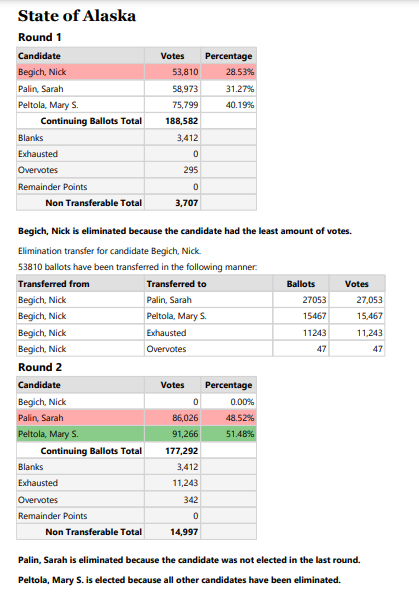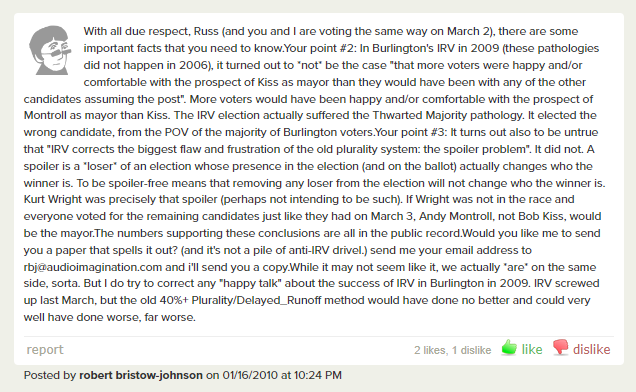@rob said in Election security under IRV:
I'm very confused about your idea of majority rule / one-person-one-vote.
Well, this is why it's good to read the paper. It's not just me.
You've said clearly that "majority rule" doesn't even make sense in a preferential ballot situation.
What, exactly, did I say clearly? I don't remember ever saying that "majority rule doesn't even make sense in a preferential ballot situation."
I don't even know what "one person one vote" means.... to me, casting one ballot is one vote.
So, if the vote represented on your ballot counted more (had more "punch") than the vote represented on my ballot and we're both a single person?
In 2000, 48.4% of American voters marked their ballots that Al Gore was preferred over George W. Bush while 47.9% marked their ballots to the contrary. Yet George W. Bush was elected to office. Did the greater number of voters preferring Gore have votes that counted as much as those from the fewer number of voters preferring Bush?
In 2016, 48.2% of American voters marked their ballots that Hillary Clinton was preferred over Donald Trump while 46.1% marked their ballots to the contrary. Yet Donald Trump was elected to office. Did the greater number of voters preferring Clinton have votes that counted as much as those from the fewer number of voters preferring Trump?
In 2009, 45.2% of Burlington voters marked their ballots tat Andy Montroll was preferred over Bob Kiss while 38.7% marked their ballots to the contrary. Yet Bob Kiss was elected to office. Did the greater number of voters preferring Montroll have votes that counted as much as those from the fewer number of voters preferring Kiss?
RCV has been challenged on that basis and passed.
... and repealed and passed again.
But I don't see how Condorcet methods magically get around that.
Of course there's Arrow and Gibbard and Gibbard–Satterthwaite, so even with Condorcet there can be circumstances where you simply cannot achieve majority rule without a contradiction. But that's when a Condorcet winner does not exist, a cycle.
When the Condorcet winner exists (so far, it looks pretty close to 100% of the time ranked ballots are used) and the Condorcet winner is elected, then majority rule is achieved and there is no sense that some voters' votes counted more than others.
Punishing voters for voting sincerely and incentivizing tactical voting? Can you even show me an example of an attempt at that under Hare RCV?
Remember there is a little difference between tactical voting (like compromising) and strategic voting (like burying). Incentivizing tactical voting happens when voters are punished for voting sincerely. That happened in Burlington in 2009. It always happens when an election is spoiled.
Violating majority rule and one-person-one-vote (they sorta go together) leads to a cascade of failures. It leads to a spoiled election and that leads to punishing some group of voters for voting sincerely and that incentivizes tactical voting which leads to tactical voting (the tactic being compromizing) in future elections.
If it was realistically possible, I'm sure someone on Twitter would telling people to vote in a particular way to game an IRV vote. I've never seen it.
That's strategic voting. I have never seen an attempt at burial (which doesn't work with Later-No-Harm, but would work with Borda). But I did see a legitimate strategic voting where two competing candidates endorsed each other publically. "Vote for me first, but rank this particular opponent of mine second."
Are they just whispering it among themselves offline?
With FPTP, people often whisper among themselves to "don't throw away your vote" and to compromize and vote for the major-party candidate best situated to beat the major-party candidate one loaths. This happens in elections that follow elections that were perceived as spoiled.
Now IRV in Burlington did demonstrate the spoiler effect in 2009 and people who voted for Kurt Wright found out that they actually caused the election of the candidate they disliked the most, simply by voting for the candidate they sincerely liked. How does that affect them in the next election?
Sorry, I'm not buying it.
Fortunately, you're not in the Vermont legislature nor Secretary of State's office (nor running for either).
losing process transparency.
Again, it's transparent enough for me but I'm not going to go down any more conspiracy theory rabbit holes. And I am working to make it more transparent by making easy ways people can re-run the tabulations
That's opaque. It's not transparent.
or analyze things in incredibly open, trouble free and sharable ways.
We cannot expect schlubs to read and understand some C++ code that someone puts on github. This is not transparent to them.
You're a coder, right? Why don't you help with that effort?
Last year I told Nicolaus Tideman I would try to write C code implementing Ranked-Pairs (using margins). Haven't done it yet. Someone somewhere has implemented Schulze, which is quite complicated.


